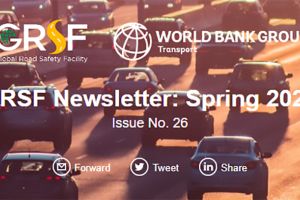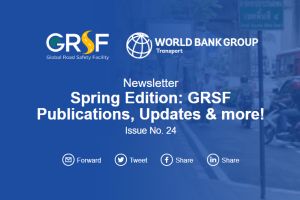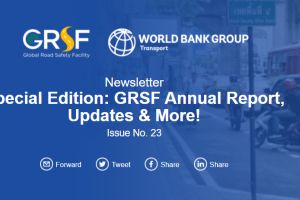GRSF Newsletter Summer Edition: GRSF Publications, Events & updates!
September 09, 2022

Publication Highlights ⌵︎
 This new Guide by World Bank's Global Road Safety Facility (GRSF) focuses on elements of safe road and roadside designs for road networks that can provide safe mobility to all road users. It also looks at the complementary changes to improve speeds, vehicle safety, road user behaviours, and post-crash care. A balanced road design must take into account these complementary system elements to maximize safety benefits. This Guide is funded by UK Aid.
This new Guide by World Bank's Global Road Safety Facility (GRSF) focuses on elements of safe road and roadside designs for road networks that can provide safe mobility to all road users. It also looks at the complementary changes to improve speeds, vehicle safety, road user behaviours, and post-crash care. A balanced road design must take into account these complementary system elements to maximize safety benefits. This Guide is funded by UK Aid. Co-funded by GRSF, with support from CITA, this Report presents the World Bank’s Motorization Management (MM) framework. This framework is intended to support client countries in the development of policies and measures aimed at managing vehicle stocks in a proactive, phased, and systematic manner to make them safer, cleaner, and more fuel efficient. The MM framework reflects a series of policy considerations and programs that can be implemented to improve the quality of fuels and vehicles in a country’s stock.
Co-funded by GRSF, with support from CITA, this Report presents the World Bank’s Motorization Management (MM) framework. This framework is intended to support client countries in the development of policies and measures aimed at managing vehicle stocks in a proactive, phased, and systematic manner to make them safer, cleaner, and more fuel efficient. The MM framework reflects a series of policy considerations and programs that can be implemented to improve the quality of fuels and vehicles in a country’s stock.
 The World Bank GRSF continued to stay in touch with counterparts in Ukraine despite the ongoing military conflict in the country, and with support from international experts, the Practical Guide for Road Safety Auditors and Inspectors in Ukraine was just released, available in both English and Ukrainian. Its role is to ensure the “Building Back Better” in Ukraine will be performed according to international best practices in terms of road safety. This is a special edition of the guide, adapted for Ukraine's road safety conditions and legislation, funded by GRSF under the Bloomberg Philanthropies Initiative for Global Road Safety (BIGRS).
The World Bank GRSF continued to stay in touch with counterparts in Ukraine despite the ongoing military conflict in the country, and with support from international experts, the Practical Guide for Road Safety Auditors and Inspectors in Ukraine was just released, available in both English and Ukrainian. Its role is to ensure the “Building Back Better” in Ukraine will be performed according to international best practices in terms of road safety. This is a special edition of the guide, adapted for Ukraine's road safety conditions and legislation, funded by GRSF under the Bloomberg Philanthropies Initiative for Global Road Safety (BIGRS).Research Highlights ⌵︎
Epidemiology of adult trauma injuries in Malawi: results from a multisite trauma registry
Large-scale multisite trauma registries with broad geographic coverage in low-income countries are rare. This lack of systematic trauma data impedes effective policy responses. All patients presenting with trauma at ten hospitals in Malawi from September 2018 to March 2020 were enrolled in a prospective registry. Using data from 49,241 cases, this article analyzes the prevalence, causes, and distribution of trauma in adult patients and the timeliness of transport to health facilities and treatment.
Read the complete article here.
Estimates of road traffic deaths in Tanzania
There is considerable uncertainty in estimates of traffic deaths in many sub-Saharan African countries, with the Global Burden of Disease (GBD) and the Global Status Report on Road Safety (GSRRS) reporting widely differing estimates. As a case study, this article reviewed and compared estimates for Tanzania.
Read the complete article here.
Socio-economic Costs and Human Impacts of Road Accidents
In 2018, the Government of Azerbaijan launched the State Road Safety Program for 2019-2023, to substantially improve the road safety situation in the country and reduce the number of fatalities, injuries, and crashes by 30%. A lack of information on the socio-economic costs of road crashes represented an important knowledge and capacity gap for handling road safety problems in Azerbaijan. To help fill this knowledge gap, and at the request of the government, the World Bank supported a study on the Socio-Economic Costs and Human Impacts of Road Accidents in Azerbaijan. GRSF supported another report on the same topic in the region of central Asia.
Event Highlight ⌵︎
GRSF organized the launch of the Saving Lives Through Private Investment in Road Safety report. Attendees learnt about different business models and financing instruments to channel private investment into road safety projects. The launch explored the enabling environment for structuring investable road safety projects in a sample of countries, looking at the barriers and opportunities, and proposing risks and mitigation strategies.
Recently Launched ⌵︎
Speeding Hurts Us All - Speed Management Myths
Speed is one of the main risk factors associated with road traffic crashes, and it is often cited as the leading contributor to fatal and severe injuries on the world’s roads. Speeding, even “only a bit over” the speed limit, has become a common practice for some, and this has come out in numerous studies. GRSF's latest video busts some of the most common myths about driving speeds.
World Bank Issues Sustainable Development Bond while Raising Awareness for the Importance of Road Safety in Developing Countries
The World Bank has issued a Sustainable Development Bond of US$33.8 million to raise awareness of the importance of road safety in developing countries. The World Bank is implementing a “safe system” approach to support road safety in its member countries. It includes strengthening countries’ capacity to design and implement effective road safety interventions and create a holistic, country-level road safety management system.
Partnerships to Save Lives ⌵︎
The Safe System Approach in Action
Road crashes kill over 1.3 million people worldwide each year and seriously injure millions more. The Safe System approach to road safety can drastically reduce road deaths – but how can it be put into action? Building on the deliberations of a joint ITF–World Bank Working Group, this Report proposes a framework for designing, implementing and assessing projects with a Safe System focus. In addition, it draws on lessons from real-world case studies to offer guidance on implementing Safe System interventions.
World Bank and United Nations Collaboration Visit on Road Safety
On June 27-28, 2022, Mr Jean Todt, UN Secretary-General Special Envoy for Road Safety, joined by Ms Priti Gautam, Program Management Officer at United Nations, and Ms Nneka Henry, Head of the UN Road Safety Fund, visited the World Bank Headquarters in Washington D.C. to discuss road safety collaboration opportunities with the World Bank management and technical staff. World Bank's road safety investments in Latin America and Africa were presented, including GRSF's role in supporting and informing these investments.
A Study of Road Safety Lead Agencies in Africa
Road safety lead agencies (RSLAs) are responsible for leading national efforts to achieve the national road safety goals. Despite the presence of these agencies in most countries, road safety performance remains a concern. Commissioned by GRSF through the African Development Bank (AfDB) and the World Bank as part of a global study on RSLAs by the World Health Organization (WHO), this study looks at the performance of RSLAs in Africa's 16 countries using quantitative and qualitative methods.
FIND FAQs in the GRSF Speed Management Hub!
Visit GRSF's online platform that allows the wide dissemination of frequently asked questions (FAQ) on speed management, together with a comprehensive resource library and the latest news and examples of best practices on this topic.
- What makes a speed management strategy successful?
- What are the best communication strategies for speed management?
- Why do police forces use unmarked cars with speed cameras? Is this fair?
- What are the main Intelligent Transport Systems (ITS) and motorcycle safety features for motorcyclist speed management?
- What is the role of speed management to provide safer routes to walk and cycle to school?


